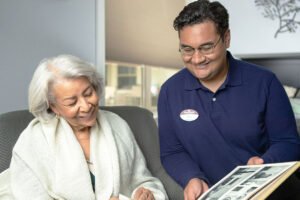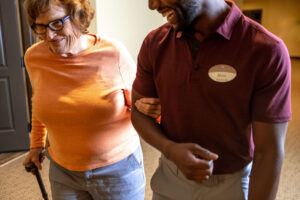Sponsored content by Nikki Easton, Brand Ave. Studios contributing writer
You walk into a room and can’t remember why. You watch a movie and can’t recall the name of its famous star. You lose your train of thought in a conversation and ask, “What were we just talking about?”
People often call these “Alzheimer’s moments.” It’s said in jest, but beneath the humor there’s usually a little concern. Such small lapses, though, are nothing to be concerned about. They’re simply a natural part of aging.
So what are the differences between these minor memory lapses and the signs of serious cognitive decline caused by Alzheimer’s disease and other forms of dementia? Here’s a simple guide.
Age-related memory loss
About 40% of people over 65 will experience some memory loss, but it won’t affect the way they function in their day-to-day lives. They can take care of the tasks that need to be done, learn new things and absorb new information, though sometimes more slowly or with more effort than when they were young.
What’s more, just as good nutrition and physical exercise keep the body strong, they can help you remain mentally fit too. Exercising the brain—doing crossword puzzles, learning a new skill or a new language, joining a book group or enrolling in an extension course—can also help your mind stay sharp throughout your life.
Dementia
Dementia is an umbrella term encompassing several different diseases, including Alzheimer’s and is very different from age-related memory loss. About 10% of Americans over 65, and 35% in their 90s, have some form of dementia, and its symptoms can have a devastating impact on the person affected by it, as well as their loved ones.

Here are some of the danger signs to look for:
• Difficulty completing simple everyday tasks like getting dressed, preparing food or paying bills
• Forgetting what ordinary objects are called and what they’re used for
• Forgetting the names of close family members
• Not knowing the year or getting lost in familiar surroundings
• Asking the same question over and over again
• Undergoing personality changes
Anyone experiencing these symptoms should see a doctor to determine the type and extent of the condition. The exam should include a complete physical workup, cognitive testing and brain imaging. In the case of Alzheimer’s disease, for example, an MRI can clearly show the physical deterioration of the brain.
What kind of care will someone with dementia need?

In the early stages of dementia, many people can remain at home with a friend or family member looking after them. Unfortunately, it’s a progressive condition that will get worse over time, eventually reaching a point where—for the sake of the caregiver as well as the person with dementia—professional care becomes necessary.
Many assisted living communities now have memory care units, and the best of these provide their residents with a better quality of life than remaining at home. The gold standard is Silver Lace Memory Care at select Primrose* Retirement Communities.
For more information, visit primroseretirement.com.
*Primrose Retirement Community, LLC is the parent company of Sweetwater Retirement Community.
